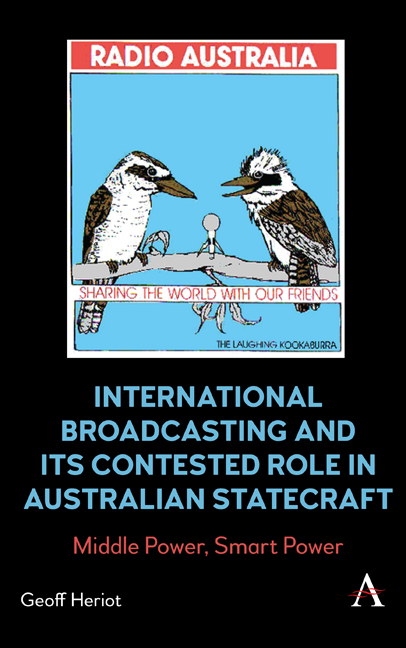 International Broadcasting and Its Contested Role in Australian Statecraft
International Broadcasting and Its Contested Role in Australian Statecraft Book contents
- Frontmatter
- Dedication
- Contents
- List of Figures
- Foreword
- Acknowledgements
- Chapter One Introduction
- Chapter Two Media and the Contest of Ideas
- Chapter Three International Broadcasting and Its Discursive Properties
- Chapter Four Mobilising ‘Softer’ Power in a Hard World
- Chapter Five Australia’s ABC: State Interests, National Evolution
- Chapter Six Purpose, Performance and Evaluation
- Chapter Seven Modernising the ABC
- Chapter Eight Policy, Priorities and Qualified Independence
- Chapter Nine Engaging with Intercultural Audiences
- Chapter Ten Indonesia, the Crucible
- Chapter Eleven Strategic Contingency and War
- Chapter Twelve Looking to the New Disorder
- Index
Chapter Four - Mobilising ‘Softer’ Power in a Hard World
Published online by Cambridge University Press: 15 November 2023
- Frontmatter
- Dedication
- Contents
- List of Figures
- Foreword
- Acknowledgements
- Chapter One Introduction
- Chapter Two Media and the Contest of Ideas
- Chapter Three International Broadcasting and Its Discursive Properties
- Chapter Four Mobilising ‘Softer’ Power in a Hard World
- Chapter Five Australia’s ABC: State Interests, National Evolution
- Chapter Six Purpose, Performance and Evaluation
- Chapter Seven Modernising the ABC
- Chapter Eight Policy, Priorities and Qualified Independence
- Chapter Nine Engaging with Intercultural Audiences
- Chapter Ten Indonesia, the Crucible
- Chapter Eleven Strategic Contingency and War
- Chapter Twelve Looking to the New Disorder
- Index
Summary
Commonly, those who comment on international politics and diplomacy associate international broadcasting with concepts of soft power and ‘public diplomacy’. Soft power is said to be a form of influence founded on the non-coercive force of attraction (Nye 1990). Joseph Nye proposes that ‘smart power’ arises from the deployment of ‘hard’ military and economic assets and non-coercive ‘soft’ power resources in appropriate combination (Nye 2009). Government-aligned public diplomacy occurs when an international actor seeks to facilitate relationship building with other state or non-state actors (Cull 2009, p. 210; Melissen 2005, p. 176). I argue that both terms – soft power and public diplomacy – are useful as abstractions and for making shorthand references to certain aspects of statecraft. But they have limited operational value when shaping the strategic function and tactical application of international broadcasting.
For a broadcaster, the reliance on such abstraction risks a failure to acknowledge its core function as political communication. The intended effect of political communication is to modify, enable or disable the agency of other actors (Chadwick 2013, p. 207). This constitutes the ‘third face’ of power in shaping, influencing or determining other peoples’ beliefs and desires (Lukes 2005a, pp. 485-486). For a government concerned with media management, the use of imprecise terminology allows it to frame the broadcasting function simplistically, as a form of image promotion akin to international public relations. Neither perspective is adequate in the context of Australia’s geostrategic and geo-economic circumstances in the Indo-Pacific.
In this chapter, therefore, I examine critically the concept of non-coercive power before identifying the function and properties of international broadcasting in relation to other agents of foreign policy propagation. Whether described as ‘soft’, ‘hard’, ‘smart’ (Nye 2009), or ‘sweet’, ‘sticky’, ‘sharp’ and ‘hegemonic’ (Mead 2009), the operative word in service of the state’s foreign policy is power. In Australia, references to soft power often preference the word ‘soft’ over ‘power’, thus trivialising the concept or limiting it to certain forms of attraction. With regard to the latter, for example, the nation’s screen development agency asserts the soft power relevance of Australian film and television industry exports, which, it argues, forge ‘a sense of relatability as they communicate Australian culture and values to the world’ (Screen Australia 2016).
- Type
- Chapter
- Information
- International Broadcasting and Its Contested Role in Australian StatecraftMiddle Power, Smart Power, pp. 61 - 88Publisher: Anthem PressPrint publication year: 2023
